- Home
- E. M. Forster
Works of E M Forster Page 17
Works of E M Forster Read online
Page 17
There came an awful moment — a moment when he almost regretted that he had a clever friend. Ansell remained absolutely motionless, moving neither hand nor head. Such behaviour is so unknown that Miss Pembroke did not realize what had happened, and kept her own hand stretched out longer than is maidenly.
“Coming to supper?” asked Ansell in low, grave tones.
“I don’t think so,” said Rickie helplessly.
Ansell departed without another word.
“Don’t mind us,” said Miss Pembroke pleasantly. “Why shouldn’t you keep your engagement with your friend? Herbert’s finding lodgings, — that’s why he’s not here, — and they’re sure to be able to give us some dinner. What jolly rooms you’ve got!”
“Oh no — not a bit. I say, I am sorry. I am sorry. I am most awfully sorry.”
“What about?”
“Ansell” Then he burst forth. “Ansell isn’t a gentleman. His father’s a draper. His uncles are farmers. He’s here because he’s so clever — just on account of his brains. Now, sit down. He isn’t a gentleman at all.” And he hurried off to order some dinner.
“What a snob the boy is getting!” thought Agnes, a good deal mollified. It never struck her that those could be the words of affection — that Rickie would never have spoken them about a person whom he disliked. Nor did it strike her that Ansell’s humble birth scarcely explained the quality of his rudeness. She was willing to find life full of trivialities. Six months ago and she might have minded; but now — she cared not what men might do unto her, for she had her own splendid lover, who could have knocked all these unhealthy undergraduates into a cocked-hat. She dared not tell Gerald a word of what had happened: he might have come up from wherever he was and half killed Ansell. And she determined not to tell her brother either, for her nature was kindly, and it pleased her to pass things over.
She took off her gloves, and then she took off her ear-rings and began to admire them. These ear-rings were a freak of hers — her only freak. She had always wanted some, and the day Gerald asked her to marry him she went to a shop and had her ears pierced. In some wonderful way she knew that it was right. And he had given her the rings — little gold knobs, copied, the jeweller told them, from something prehistoric and he had kissed the spots of blood on her handkerchief. Herbert, as usual, had been shocked.
“I can’t help it,” she cried, springing up. “I’m not like other girls.” She began to pace about Rickie’s room, for she hated to keep quiet. There was nothing much to see in it. The pictures were not attractive, nor did they attract her — school groups, Watts’ “Sir Percival,” a dog running after a rabbit, a man running after a maid, a cheap brown Madonna in a cheap green frame — in short, a collection where one mediocrity was generally cancelled by another. Over the door there hung a long photograph of a city with waterways, which Agnes, who had never been to Venice, took to be Venice, but which people who had been to Stockholm knew to be Stockholm. Rickie’s mother, looking rather sweet, was standing on the mantelpiece. Some more pictures had just arrived from the framers and were leaning with their faces to the wall, but she did not bother to turn them round. On the table were dirty teacups, a flat chocolate cake, and Omar Khayyam, with an Oswego biscuit between his pages. Also a vase filled with the crimson leaves of autumn. This made her smile.
Then she saw her host’s shoes: he had left them lying on the sofa. Rickie was slightly deformed, and so the shoes were not the same size, and one of them had a thick heel to help him towards an even walk. “Ugh!” she exclaimed, and removed them gingerly to the bedroom. There she saw other shoes and boots and pumps, a whole row of them, all deformed. “Ugh! Poor boy! It is too bad. Why shouldn’t he be like other people? This hereditary business is too awful.” She shut the door with a sigh. Then she recalled the perfect form of Gerald, his athletic walk, the poise of his shoulders, his arms stretched forward to receive her. Gradually she was comforted.
“I beg your pardon, miss, but might I ask how many to lay?” It was the bedmaker, Mrs. Aberdeen.
“Three, I think,” said Agnes, smiling pleasantly. “Mr. Elliot’ll be back in a minute. He has gone to order dinner.
“Thank you, miss.”
“Plenty of teacups to wash up!”
“But teacups is easy washing, particularly Mr. Elliot’s.”
“Why are his so easy?”
“Because no nasty corners in them to hold the dirt. Mr. Anderson — he’s below-has crinkly noctagons, and one wouldn’t believe the difference. It was I bought these for Mr. Elliot. His one thought is to save one trouble. I never seed such a thoughtful gentleman. The world, I say, will be the better for him.” She took the teacups into the gyp room, and then returned with the tablecloth, and added, “if he’s spared.”
“I’m afraid he isn’t strong,” said Agnes.
“Oh, miss, his nose! I don’t know what he’d say if he knew I mentioned his nose, but really I must speak to someone, and he has neither father nor mother. His nose! It poured twice with blood in the Long.”
“Yes?”
“It’s a thing that ought to be known. I assure you, that little room!... And in any case, Mr. Elliot’s a gentleman that can ill afford to lose it. Luckily his friends were up; and I always say they’re more like brothers than anything else.”
“Nice for him. He has no real brothers.”
“Oh, Mr. Hornblower, he is a merry gentleman, and Mr. Tilliard too! And Mr. Elliot himself likes his romp at times. Why, it’s the merriest staircase in the buildings! Last night the bedmaker from W said to me,’What are you doing to my gentlemen? Here’s Mr. Ansell come back ‘ot with his collar flopping.’ I said, ‘And a good thing.’ Some bedders keep their gentlemen just so; but surely, miss, the world being what it is, the longer one is able to laugh in it the better.”
Bedmakers have to be comic and dishonest. It is expected of them. In a picture of university life it is their only function. So when we meet one who has the face of a lady, and feelings of which a lady might be proud, we pass her by.
“Yes?” said Miss Pembroke, and then their talk was stopped by the arrival of her brother.
“It is too bad!” he exclaimed. “It is really too bad.”
“Now, Bertie boy, Bertie boy! I’ll have no peevishness.”
“I am not peevish, Agnes, but I have a full right to be. Pray, why did he not meet us? Why did he not provide rooms? And pray, why did you leave me to do all the settling? All the lodgings I knew are full, and our bedrooms look into a mews. I cannot help it. And then — look here! It really is too bad.” He held up his foot like a wounded dog. It was dripping with water.
“Oho! This explains the peevishness. Off with it at once. It’ll be another of your colds.”
“I really think I had better.” He sat down by the fire and daintily unlaced his boot. “I notice a great change in university tone. I can never remember swaggering three abreast along the pavement and charging inoffensive visitors into a gutter when I was an undergraduate. One of the men, too, wore an Eton tie. But the others, I should say, came from very queer schools, if they came from any schools at all.”
Mr. Pembroke was nearly twenty years older than his sister, and had never been as handsome. But he was not at all the person to knock into a gutter, for though not in orders, he had the air of being on the verge of them, and his features, as well as his clothes, had the clerical cut. In his presence conversation became pure and colourless and full of understatements, and — just as if he was a real clergyman — neither men nor boys ever forgot that he was there. He had observed this, and it pleased him very much. His conscience permitted him to enter the Church whenever his profession, which was the scholastic, should demand it.
“No gutter in the world’s as wet as this,” said Agnes, who had peeled off her brother’s sock, and was now toasting it at the embers on a pair of tongs.
“Surely you know the running water by the edge of the Trumpington road? It’s turned on occasionally to clear away the refu
se — a most primitive idea. When I was up we had a joke about it, and called it the ‘Pem.’”
“How complimentary!”
“You foolish girl, — not after me, of course. We called it the ‘Pem’ because it is close to Pembroke College. I remember— “ He smiled a little, and twiddled his toes. Then he remembered the bedmaker, and said, “My sock is now dry. My sock, please.”
“Your sock is sopping. No, you don’t!” She twitched the tongs away from him. Mrs. Aberdeen, without speaking, fetched a pair of Rickie’s socks and a pair of Rickie’s shoes.
“Thank you; ah, thank you. I am sure Mr. Elliot would allow it.”
Then he said in French to his sister, “Has there been the slightest sign of Frederick?”
“Now, do call him Rickie, and talk English. I found him here. He had forgotten about us, and was very sorry. Now he’s gone to get some dinner, and I can’t think why he isn’t back.”
Mrs. Aberdeen left them.
“He wants pulling up sharply. There is nothing original in absent-mindedness. True originality lies elsewhere. Really, the lower classes have no nous. However can I wear such deformities?” For he had been madly trying to cram a right-hand foot into a left-hand shoe.
“Don’t!” said Agnes hastily. “Don’t touch the poor fellow’s things.” The sight of the smart, stubby patent leather made her almost feel faint. She had known Rickie for many years, but it seemed so dreadful and so different now that he was a man. It was her first great contact with the abnormal, and unknown fibres of her being rose in revolt against it. She frowned when she heard his uneven tread upon the stairs.
“Agnes — before he arrives — you ought never to have left me and gone to his rooms alone. A most elementary transgression. Imagine the unpleasantness if you had found him with friends. If Gerald— “
Rickie by now had got into a fluster. At the kitchens he had lost his head, and when his turn came — he had had to wait — he had yielded his place to those behind, saying that he didn’t matter. And he had wasted more precious time buying bananas, though he knew that the Pembrokes were not partial to fruit. Amid much tardy and chaotic hospitality the meal got under way. All the spoons and forks were anyhow, for Mrs. Aberdeen’s virtues were not practical. The fish seemed never to have been alive, the meat had no kick, and the cork of the college claret slid forth silently, as if ashamed of the contents. Agnes was particularly pleasant. But her brother could not recover himself. He still remembered their desolate arrival, and he could feel the waters of the Pem eating into his instep.
“Rickie,” cried the lady, “are you aware that you haven’t congratulated me on my engagement?”
Rickie laughed nervously, and said, “Why no! No more I have.”
“Say something pretty, then.”
“I hope you’ll be very happy,” he mumbled. “But I don’t know anything about marriage.”
“Oh, you awful boy! Herbert, isn’t he just the same? But you do know something about Gerald, so don’t be so chilly and cautious. I’ve just realized, looking at those groups, that you must have been at school together. Did you come much across him?”
“Very little,” he answered, and sounded shy. He got up hastily, and began to muddle with the coffee.
“But he was in the same house. Surely that’s a house group?”
“He was a prefect.” He made his coffee on the simple system. One had a brown pot, into which the boiling stuff was poured. Just before serving one put in a drop of cold water, and the idea was that the grounds fell to the bottom.
“Wasn’t he a kind of athletic marvel? Couldn’t he knock any boy or master down?”
“Yes.”
“If he had wanted to,” said Mr. Pembroke, who had not spoken for some time.
“If he had wanted to,” echoed Rickie. “I do hope, Agnes, you’ll be most awfully happy. I don’t know anything about the army, but I should think it must be most awfully interesting.”
Mr. Pembroke laughed faintly.
“Yes, Rickie. The army is a most interesting profession, — the profession of Wellington and Marlborough and Lord Roberts; a most interesting profession, as you observe. A profession that may mean death — death, rather than dishonour.”
“That’s nice,” said Rickie, speaking to himself. “Any profession may mean dishonour, but one isn’t allowed to die instead. The army’s different. If a soldier makes a mess, it’s thought rather decent of him, isn’t it, if he blows out his brains? In the other professions it somehow seems cowardly.”
“I am not competent to pronounce,” said Mr. Pembroke, who was not accustomed to have his schoolroom satire commented on. “I merely know that the army is the finest profession in the world. Which reminds me, Rickie — have you been thinking about yours?”
“No.”
“Not at all?”
“No.”
“Now, Herbert, don’t bother him. Have another meringue.”
“But, Rickie, my dear boy, you’re twenty. It’s time you thought. The Tripos is the beginning of life, not the end. In less than two years you will have got your B.A. What are you going to do with it?”
“I don’t know.”
“You’re M.A., aren’t you?” asked Agnes; but her brother proceeded —
“I have seen so many promising, brilliant lives wrecked simply on account of this — not settling soon enough. My dear boy, you must think. Consult your tastes if possible — but think. You have not a moment to lose. The Bar, like your father?”
“Oh, I wouldn’t like that at all.”
“I don’t mention the Church.”
“Oh, Rickie, do be a clergyman!” said Miss Pembroke. “You’d be simply killing in a wide-awake.”
He looked at his guests hopelessly. Their kindness and competence overwhelmed him. “I wish I could talk to them as I talk to myself,” he thought. “I’m not such an ass when I talk to myself. I don’t believe, for instance, that quite all I thought about the cow was rot.” Aloud he said, “I’ve sometimes wondered about writing.”
“Writing?” said Mr. Pembroke, with the tone of one who gives everything its trial. “Well, what about writing? What kind of writing?”
“I rather like,” — he suppressed something in his throat,— “I rather like trying to write little stories.”
“Why, I made sure it was poetry!” said Agnes. “You’re just the boy for poetry.”
“I had no idea you wrote. Would you let me see something? Then I could judge.”
The author shook his head. “I don’t show it to any one. It isn’t anything. I just try because it amuses me.”
“What is it about?”
“Silly nonsense.”
“Are you ever going to show it to any one?”
“I don’t think so.”
Mr. Pembroke did not reply, firstly, because the meringue he was eating was, after all, Rickie’s; secondly, because it was gluey and stuck his jaws together. Agnes observed that the writing was really a very good idea: there was Rickie’s aunt, — she could push him.
“Aunt Emily never pushes any one; she says they always rebound and crush her.”
“I only had the pleasure of seeing your aunt once. I should have thought her a quite uncrushable person. But she would be sure to help you.”
“I couldn’t show her anything. She’d think them even sillier than they are.”
“Always running yourself down! There speaks the artist!”
“I’m not modest,” he said anxiously. “I just know they’re bad.”
Mr. Pembroke’s teeth were clear of meringue, and he could refrain no longer. “My dear Rickie, your father and mother are dead, and you often say your aunt takes no interest in you. Therefore your life depends on yourself. Think it over carefully, but settle, and having once settled, stick. If you think that this writing is practicable, and that you could make your living by it — that you could, if needs be, support a wife — then by all means write. But you must work. Work and drudge. Begin at the bottom of t
he ladder and work upwards.”
Rickie’s head drooped. Any metaphor silenced him. He never thought of replying that art is not a ladder — with a curate, as it were, on the first rung, a rector on the second, and a bishop, still nearer heaven, at the top. He never retorted that the artist is not a bricklayer at all, but a horseman, whose business it is to catch Pegasus at once, not to practise for him by mounting tamer colts. This is hard, hot, and generally ungraceful work, but it is not drudgery. For drudgery is not art, and cannot lead to it.
“Of course I don’t really think about writing,” he said, as he poured the cold water into the coffee. “Even if my things ever were decent, I don’t think the magazines would take them, and the magazines are one’s only chance. I read somewhere, too, that Marie Corelli’s about the only person who makes a thing out of literature. I’m certain it wouldn’t pay me.”
“I never mentioned the word ‘pay,’” said Mr. Pembroke uneasily.
“You must not consider money. There are ideals too.”
“I have no ideals.”
“Rickie!” she exclaimed. “Horrible boy!”
“No, Agnes, I have no ideals.” Then he got very red, for it was a phrase he had caught from Ansell, and he could not remember what came next.
“The person who has no ideals,” she exclaimed, “is to be pitied.”
“I think so too,” said Mr. Pembroke, sipping his coffee. “Life without an ideal would be like the sky without the sun.”
Rickie looked towards the night, wherein there now twinkled innumerable stars — gods and heroes, virgins and brides, to whom the Greeks have given their names.
“Life without an ideal— “ repeated Mr. Pembroke, and then stopped, for his mouth was full of coffee grounds. The same affliction had overtaken Agnes. After a little jocose laughter they departed to their lodgings, and Rickie, having seen them as far as the porter’s lodge, hurried, singing as he went, to Ansell’s room, burst open the door, and said, “Look here! Whatever do you mean by it?”
“By what?” Ansell was sitting alone with a piece of paper in front of him. On it was a diagram — a circle inside a square, inside which was again a square.

 The Celestial Omnibus and Other Stories
The Celestial Omnibus and Other Stories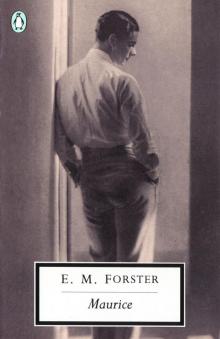 Maurice
Maurice The Longest Journey
The Longest Journey Howards End
Howards End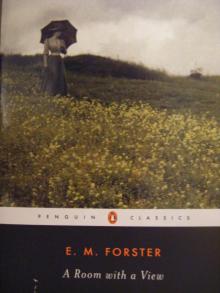 A Room with a View
A Room with a View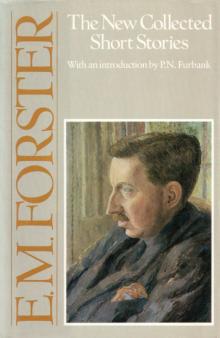 The New Collected Short Stories
The New Collected Short Stories A Passage to India
A Passage to India Where Angels Fear to Tread
Where Angels Fear to Tread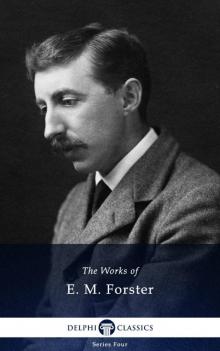 Works of E M Forster
Works of E M Forster Selected Stories
Selected Stories The Machine Stops
The Machine Stops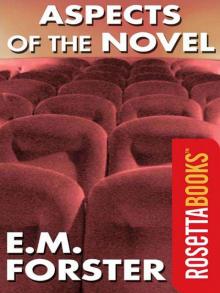 Aspects of the Novel
Aspects of the Novel